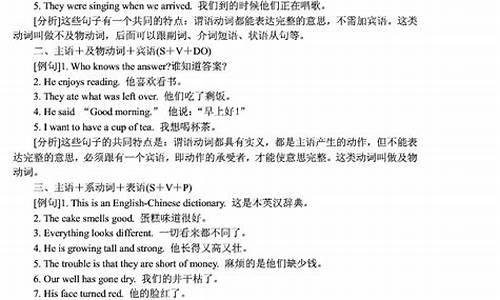用句子回答的英语怎么说_用完整的句子回答问题的英文
1.回答和问都带有is的英语句子,有哪一些?
2.翻译中文句子 (用英语回答)
3.英语句子:what'syour friend like?怎样回答?
4.用英语翻译几个简答的句子,谢谢
5.英语里怎么把句子变成一般疑问句并做出回答

Guilin, which lies in the northwest of Guangxi (Province), is world-famous for its beautiful scenery.It has many places of interest. Every year many tourists go there to enjoy the scenery. We tourists can take a boat to visit each beauty spot.Come to Guilin, you will be sure to he a good time.
闻名于世 be world-famous
风景名胜 places of interest
风景区 beauty spot
广西西北部 the northwest of Guangxi (Province )
回答和问都带有is的英语句子,有哪一些?
Some people stay home;some people go out on a journey and some go to cinema to watch a latest film.
翻译中文句子 (用英语回答)
您好,1.is用作系动词的情况。如扰
Is he a teacher? 答语:Yes he is.
2.is用作助动词的情况。
Is Tony reading books?答语:No,he isn't.
英语句子:what'syour friend like?怎样回答?
明天我会把书还给图书馆
Tomorrow I will take the book to the library
我打算每天都写日记
I'm going to write a diary every day
这块手表花了我300元。
The watch cost me 300 yuan.
他花了大量时间学英语
He spent a lot of time to learn English
如果明天不下雨,我们就去野餐
If it doesn't rain tomorrow, we'll he a picnic
我早起床是为了按时到校
I got up early so as to get to school on time
用英语翻译几个简答的句子,谢谢
可以这样回答:she is a beautiful girl.(她是一个漂亮女孩)
what's your friend like?意思是:你的朋友怎么样?
重点词汇
friend 朋友 ; 友人 ; 赞助者 ; 支持者 ; 自己人 ; 同志 ; 同伙 ; 同盟者 ; <诗>与…为友
like 喜欢 ; 喜欢做 ; 想 ; 要 ; 希望 ; 像 ; 类似 ; 相似 ; …怎么样 ; 符合…
短语:
Like Wind 如风 ; 往事如烟 ; 沉醉于风中
Like product 同类产品 ; 相同产品 ; 相似产品 ; 类似产品
More like 多想 ; 更喜欢 ; 有多喜欢 ; 更像
seem like 好像 ; 似乎像
英语里怎么把句子变成一般疑问句并做出回答
1.你中文学得怎么样了?
How is your Chinese learning?
2.你的中文练得如何了?
How about your Chinese practice?
3.你家有电视机吗?是你成都的家。
Do you he a TV at home? Your home in Chengdu.
4.你太了解中国人了。
You know Chinese too well.
5.很多人崇洋媚外。
A lot of people worship and he blind faith in foreign things.
6.我们对基因的了解才刚刚开始。
What we know about gene is just a start.
7.我要成功!
I want to succeed!
或:I want to be successful.
1.is that your football?
Yes, it is./No, it isn't.(有BE动词,而且问的是单数所以回答用it)
2.Are those his books?
Yes, they are./No, they aren't.(问的是复数,所以用they回答)
3.Are Jim and Tom good friends?
Yes, they are./No, they aren't.(问的是人但是是复数所以也用they)
4.Is your birthday November 1st?
Yes, it is./No, it isn't.(问的是你的生日,还是物)
5.Is his son twelve years old?
Yes, he is./No, he isn't.(问的是他的儿子,是人,单数,男他,用he)
一般疑问句构成:
1)中谓语动词是to be、助动词、情态动词时,则将它们(提前)放到主语前面。如:
Is he an engineer?(他是工程师吗?)/
He you got today’s newspaper? (你有今天的报纸吗?)/
Shall we go to see a film this evening? (我们今晚去看**好吗?)/ Can you explain it ?(你能解释它吗?)/
Is there any fish for supper?(晚饭有鱼吗?)/
Would you like to go out for a walk?(你想出去散步吗?)
2)谓语动词如果没有上述词语而是其他动词时,则在主语前面加助动词do / does / did, 原来的谓语动词改为原形。
如:Do you get up at six every morning?(你天天早晨六点起身吗?)/
Does she study hard?(她学习努力吗?)/
Did you go there yesterday?(昨天你去那儿了吗?)
3)一般疑问句的回答:
一般疑问句通常用简略形式来回答。如:
Will you join us in playing basketball?(你加入我们打篮球好吗?)
—Yes, we will.(是的我们会。)/ —No, we won’t.(不我们不会。)
He you got today’s newspaper?(你有今天的报纸吗?)
—Yes, I he .(是的有。)/ —No, I hen’t.(不没有。)
回答时所用的时态应和问句里的时态一致。
[注意] 回答must或者may开头的疑问句要小心,参见情态动词有关内容。
特殊情况:
4)一般疑问句的否定结构(即否定形式的一般疑问句)表示惊奇、责怪、建议、看法等,只要将“not”置于主语之后或者将“not”放到主语之前与be, he等助动词或情态动词合并在一起就可以了。如:
Will he not come?(他难道不来吗?)/
Isn’t your sister a Party member?(你的姐姐不是党员吗?)/
Hen’t you any brothers?(你没有哥哥吗?)/
Don’t you like the play?(你难道不喜欢这个话剧吗?)/
Can’t we walk a little farther?(我们不能走远些吗?)/
Won’t you sit down?(你不想坐下吗?)/
Hasn’t she heard of the matter?(她没听说过这事儿?)
这种否定结构的疑问句的回答与汉语的习惯不同。如果回答是肯定的,就用“yes+肯定结构”;如果回答是否定的,就用“no+否定结构”。(情况与反意问句类似。)如:
Can’t he answer the question? (他不能回答这个问题吗?)
—Yes,he can.(不,他能回答这个问题。)
—No,he can’t. (是的,他不能回答这个问题。)
声明:本站所有文章资源内容,如无特殊说明或标注,均为采集网络资源。如若本站内容侵犯了原著者的合法权益,可联系本站删除。

